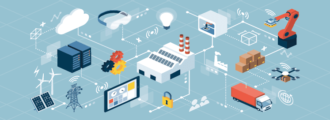Companies face many challenges in managing their resources and processes in today’s fast-paced, global economy. Implementing software solutions like Enterprise Resource Planning (ERP) and Supply Chain Management (SCM) solutions can help companies overcome these challenges.
ERP and SCM systems have some overlapping functionality, but they serve distinct purposes in managing a company’s operations. This article explains the key differences between ERP and SCM software and how they can work together to improve efficiency and support growth.
Understanding ERP vs. SCM in Your Technical Landscape
While ERP and SCM systems serve different purposes, they are not mutually exclusive, and many organizations use both to effectively manage their internal operations and supply chain processes. There are a few key differentiating factors between ERP and SCM systems, including data flow, scope and focus, critical functional areas, goals and objectives, and overall time horizon.
What is Enterprise Resource Planning?
ERP software is an integrated system designed to manage and automate business processes. The goal of an ERP system is to consolidate and streamline all of the company’s operations, including finance, accounting, HR, sales, and operations, into a single, unified system. ERP software provides a comprehensive view of the company’s resources, which can help employees make informed decisions about resource allocation, financial planning, and hiring.
ERP systems are typically modular, meaning each module handles a specific area of the company’s operations. For example, the finance module handles accounting, budgeting, and financial data, while the human resources module handles onboarding, recruiting, and benefits. Integrating these modules allows an ERP system to provide real-time visibility into the company’s operations, allowing employees to make more informed decisions.
Benefits of an ERP Solution
Here are a few of the key benefits of enterprise resource planning software. If you want to dive deeper into ERP benefits, check out our previous article listed below.
Cost Savings
The visibility you gain with an ERP system will help you spot inefficiencies across the organization, lower operational costs, and boost employee productivity.
Better Customer Experiences
The best way to stay competitive in this market is to deliver exceptional customer experiences. Adding the customer relationship management (CRM) module to your ERP system gives you access to real-time customer data in one place. This helps sales, marketing, and support teams deliver personalized experiences to build better customer relationships.
Enhanced Data Security
In today’s world, companies can never be too secure. ERP software can better protect your data by unifying it. Instead of having your company’s sensitive data in different places with varying degrees of security, you can increase the level of protection. Cloud ERP systems also add an additional layer of protection and security.
You can learn more about ERP solutions by reading our article, Top Benefits of ERP Business Software.
What is Supply Chain Management?
Supply Chain Management software manages the flow of goods, information, and finances between a company and its customers, partners, and suppliers. SCM software aims to optimize the supply chain by coordinating the movement of materials, information, and finances from the point of origin to the point of consumption.
An SCM system provides visibility into the entire supply chain, from the procurement of raw materials to the delivery of finished products to customers. This visibility allows companies to manage inventory levels better, reduce lead times, and improve the accuracy of demand forecasts. SCM systems also help companies collaborate with suppliers and customers, enabling them to share information and optimize their operations.
Benefits of Supply Chain Management Software
Now, let’s dive into a few of the critical benefits of supply chain management software.
Improve Collaboration
As we mentioned, SCM systems help companies collaborate with everyone across the supply chain. With all the key stakeholders in a centralized hub, everyone can get real-time, accurate information to stay up to date on the supply chain.
Enhance Inventory Management
Gain visibility into every aspect of inventory, from orders, stock levels, raw materials, and more, in a single system.
Increase Costs and Productivity
SCM software improves the efficiency of an organization by integrating the critical aspects of the supply chain. This leads to increased productivity and costs.
Difference Between ERP and SCM Software
The differences between enterprise resource planning and supply chain management software is actually pretty simple. It all comes down to their purpose. ERP software is focused on managing the business’s internal work processes, while SCM software is focused on addressing the external supply chain. Here are some of the unique features of each software.
Unique features of the ERP system:
- Customer relationship management
- Financial management
- Human resources management
- Reporting and analytics
Unique features of the SCM system:
- Demand forecasting
- Supply chain processes
- Order fulfillment
- Transportation management
- Shipping management
How Can ERP Improve Supply Chain Management?
Supply chain management has always been challenging, but COVID-19 wreaked havoc on supply chains and exposed many vulnerabilities. Many businesses rely on enterprise resource planning systems to manage the supply chain process to overcome these issues.
ERP software gives your organization a real-time view of business processes and helps streamline them from end to end. This saves considerable time and money by being more agile and scalable.
Here are some ways of combining ERP in your supply chain management strategy:
Visibility—ERP systems provide accurate, real-time visibility into products, raw materials, and everything that moves through the supply chain. This bird’s eye view is critical to operating efficiently between customers and external suppliers.
Supply Chain Automation—ERPs can automate many complex production processes to save time and ensure on-time completion and delivery.
Planning—ERPs come with comprehensive planning capabilities that allow companies to predict inventory and production requirements based on forecasting, demand, and seasonal spikes.
Collaboration—ERPs enhance collaboration internally and externally. With sales, procurement, inventory, and product teams using the same database for information, you can increase communication, collaboration, and accuracy.
Purchasing—You can improve the purchasing process through automation. This helps give your entire organization an accurate view of what’s been ordered and when it will be delivered.
Inventory and Warehouse Management—ERP suites integrated with your inventory and warehouse management systems can optimize inventory levels and ensure warehouses operate at peak performance.
Procurement—ERPs can manage procurement and supply resources and materials for your supply chain. You can streamline and automate tasks like the transportation of materials, vendor communication, and more.
Shipping—An ERP system can create customer invoices as soon as a product has shipped. It can also maintain shipment and delivery details and conduct quality assurance checks on packaging.
ERP vs. SCM: What’s Right For Your Business?
Enterprise resource planning and supply chain management SCM software serve different purposes in managing a company’s operations. While there is some overlap in functionality, they are designed to address different aspects of the business.
Companies should carefully evaluate their needs and choose the software solution that best fits their requirements. Ultimately, the right software solution can help companies improve their efficiency, reduce costs, and gain a competitive advantage in today’s global economy.
Partner With Surety System Experts
If you’re looking to implement SCM and ERP systems, Surety Systems is here to help.
Our team of senior-level ERP consultants will partner with your company to determine the right technology investments for your business requirements and be there to help you through each stage of the implementation journey.
Contact us today to learn more and get started on your next digital transformation project.



